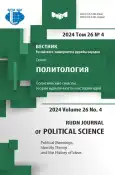Translation of Value-Semantic Narratives in Public Digital Communication: Opportunities and Limitations
- Authors: Romashkina A.B.1, Kirichuk D.A.1
-
Affiliations:
- RUDN University
- Issue: Vol 26, No 4 (2024): Political Meanings, Identity Theory and the History of Ideas
- Pages: 630-643
- Section: THEORY AND PRACTICE
- URL: https://journal-vniispk.ru/2313-1438/article/view/322397
- DOI: https://doi.org/10.22363/2313-1438-2024-26-4-630-643
- EDN: https://elibrary.ru/VGXJEQ
- ID: 322397
Cite item
Full Text
Abstract
The study is devoted to the role of public digital communication in the processes of formation and translation of value-semantic narratives in modern political communication. The authors consider the importance of the axiological space of the state in the management of public and individual consciousness. It is determined that Internet communication and digital algorithms contribute to the formation of a variety of agendas and discourses, which are influenced not only by the state, but also by new subjects of political communication - “digital elites”, bloggers and other users who form public digital communication, including from abroad. Traditional agents of socialization cannot fully shape a person’s worldview, and therefore citizens may be more susceptible to manipulative algorithmic tools of digital platforms on which destructive narratives are broadcast that contribute to the destruction of the worldview and values of society. Therefore, in order to preserve the sovereignty of the state and to resist a new type of colonialism based on the technological advantages of Western countries, it is necessary to ensure information, technological and cultural security, which will also protect the integral axiological space necessary for the consolidation of society.
About the authors
Albina B. Romashkina
RUDN University
Author for correspondence.
Email: albrom@mail.ru
ORCID iD: 0009-0000-2452-0738
PhD in Political Sciences. Senior Lecturerofthe Departmentof Comparative Political Science
Moscow, Russian FederationDaria A. Kirichuk
RUDN University
Email: dariakirichuck@gmail.com
ORCID iD: 0009-0000-0378-4443
Assistant Professor of the Department of Comparative Political Science
Moscow, Russian FederationReferences
- Adamopoulou, E., & Moussiades, L. (2020). Chatbots: History, technology, and applications. Machine Learning with Applications, 2, 1–18. https://doi.org/10.1016/j.mlwa.2020.100006
- Сastells, M. (2017). The power of communication. Moscow: The Higher School of Economics Publishing House. (In Russian).
- Fedorchenko, S.N. (2017). Political coding: the problem and comparative studies of communication technologies management of mass consciousness. Journal of Political Research, 1(3), 44–78. (In Russian).
- Fedorchenko, S.N. (2023). The power of the algorithm: Technologies of legitimization of political regimes in the conditions of digitalization. Moscow: Prospekt. (In Russian).
- Feezell, J.T. (2018). Agenda Setting through Social Media: The Importance of Incidental News Exposure and Social Filtering in the Digital Era. Political Research Quarterly, 71(2), 482–494. https://doi.org/10.1177/1065912917744895
- French, R.P. (2016). Deconstructing the End of Leadership: Postmodernity, Epistemology, and Worldviews, Sage Open, 6(1), 1–10. https://doi.org/10.1177/2158244016628588
- Hildebrandt, M. (2018). Algorithmic regulation and the rule of law. Phil. Trans. R. Soc, 376(2128), 1–11. https://dx.doi.org/10.1098/rsta.2017.0355.
- Krawatzek, F.A. (2022). Sign of Things to Come? Youth and Politics: Regimes, Values and Agency.Europe-Asia Studies, 74(7), 1105–1122. https://doi.org/10.1080/09668136.2022.2108260
- Kulakova, T.A., Lukyanova, G.V., & Volkova, A.V. (2022). From economic paternalism to digital control. Problems of modern economics, 1(81), 79–83. (In Russian).
- Kurochkin, A.V., & Morozova, S.S. (2024). Digital colonization as a threat to national security. Political Expertise: POLITEX, 20(1), 64–72. (In Russian). https://doi.org/10.21638/spbu23.2024.105
- Kwet, M. (2024). Digital colonialism: US empire and the new imperialism in the Global South. Race & Class, 60(4), 3–26. https://doi.org/10.1177/0306396818823172
- Lukyanova, G.V., & Solovyov, A.Yu. (2024). Features of agenda setting in Telegram. Izvestiya of Saratov University. Sociology. Politology, 24(1), 90–97. (In Russian). https://doi.org/10.18500/1818-9601-2024-24-1-90-97
- Makliuen, M.G. (2018). Understanding media: the extensions of man. Moscow: Kuchkovo pole. (In Russian).
- Manovich, L. (2016). The Science of Culture? Social Computing, Digital Humanities and Cultural Analytics. Journal of Cultural Analytics, 1(1), https://doi.org/10.22148/16.004
- Ulbricht, L. (2020). Scraping the demos. Digitalization, web scraping and the democratic project. Democratization, 27(3), 426–442. https://doi.org/10.1080/13510347.2020.1714595
- Van Dijk, T.A. (2015). Discourse and power: Representation of dominance in language and communication. Moscow: URSS, “LIBROCOM”. (In Russian).
- Volodenkov, S.V., Fedorchenko, S.N., & Pechenkin, N.M. (2023). Peculiarities of Worldview Formation in the Contemporary Digital Environment: The Analysis of Academic Discourses. Discourse-P, 20(1), 8–26. (In Russian). https://doi.org/10.17506/18179568_2023_20_1_8
- Volodenkov, S.V., Zotov, V.V., Conson, G.R., & Gurov, O.N. (2024). The Prospects of Creating a Prosocial Image of The Russia’s Digital Future (Expert Assessment). NOMOTHETIKA: Philosophy. Sociology. Law, 49(1), 39–51. (In Russian). https://doi.org/10.52575/2712-746X-2024-49-1-39-51
- Zuboff, S. (2019). The age of surveillance capitalism: The fight for a human future at the new frontier of power. New York: Public Affairs.
Supplementary files









